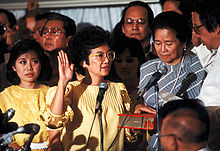Women's rights in Philippines
In recent years, the Filipino government has addressed the rights of women under a multitude of legislative schemes including workplace discrimination, domestic violence, sexual harassment and human trafficking.
[4] In July 2024 A first-ever empowerment and wellness event for women was recently held to rousing success at the GMA Sports Complex in General Mariano Alvarez, Cavite.
Attendees enjoyed free haircuts, manicures, pedicures, and massages, all aimed at promoting wellness and empowerment among women in the Philippines.
Many Filipino men were opposed to the idea, and held fast to the traditional view that a woman's place was cooking, cleaning and child rearing in the home.
The men of this perspective were primarily concerned that the familial dynamic would destabilize if women were to formally step outside their customary role.
[6] From there on, various suffrage bills were sponsored by a number of prominent men in society including; Assemblyman Melecio Severino of Negros Occidental in 1912, Mariano Cuenco of Cebu in 1916, and various assemblymen from Bulacan, Laguna and Tomas Luna in 1918.
[9] President Manuel L. Quezon declared his favour towards the suffragette movement in a speech delivered at Malacanang Palace in Manila on September 30, 1936.
The Honourable Patricia B. Licuanan, in her address at the United Nations in 2011, mentioned the high academic achievement of women, yet recognised their under-representation in some occupational fields.
[17] In areas such as engineering, technology, religion, law, trade and agriculture the graduates predominantly remain to be male.
Accessibility and attainment of education has been a major contributor to the general well-being and standard of living for not only all women, but all people, throughout the Philippines.
The Philippine Statistics Authority’s National Demographic and Health Survey 2013 revealed that: The PSA’s National Demographic and Health Survey 2022 found that 17.5 % of Filipino women ages 15-49 have experienced physical, sexual or emotional violence from their intimate partners.
Under the Revised Penal Code, midwives and physicians who have carried out abortions could face imprisonment for six years –even if they had the consent of the pregnant woman.
Those women who have received proper treatment for their health complications due to abortion procedure have often felt stigmatized by those treating them.


